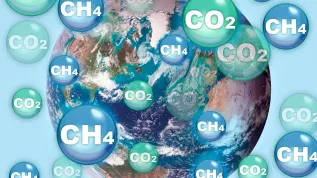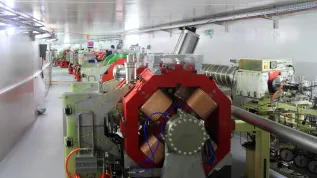
It isn`t necessarily completely empty in a vacuum. It turns out that particles form and disappear there. And this is because particles may break the principle of energy conservation for a very, very short time, says physicist Prof. Grzegorz Wrochna.
During the Science Picnic, throughout the day we collected questions that visitors wanted to ask the scientists. Now we ask researchers some of these questions.
With the question "Why do particles form and disappear in a vacuum?" we turned to elementary particle physicist Prof. Grzegorz Wrochna from the National Centre for Nuclear Research in Świerk.
It would seem that the vacuum is emptiness, the space in which there are no particles. But it turns out that even if we get rid of matter particles, it will not be so completely empty. Professor Wrochna says: "Particles do form and disappear in a vacuum, but this happens only for a very, very, very short time. That is why we call them virtual particles, as opposed to real particles".
"Physicians use the word vacuum do describe the lowest energy state" - explains the physicist. This definition is not entirely clear if we do not understand what particles are for physicists. "The most important feature of a particle is that it is a portion of energy, called a quantum".
"And because in nature energy must be preserved, particles - portions of energy - can not form out of nothing, nor can they disappear into nothingness" - the researcher says.
He adds that the law of conservation of energy is the guard of this rule. This law, however, is a rather indulgent guard that can turn a blind eye to minor irregularities, as long as they are very, very brief. "Pauli`s principle says that the more we want to break the law of conservation of energy - the more energy we want to `borrow` - the shorter the time for which we can do it. That is why the particle-antiparticle pairs may form, but only for a very, very short time" - he says.
He explains that these particles "borrow" energy, or break the law of conservation of energy, but in an instant - by annihilating - they give back this "borrowed" energy. This way, in general, nature zeroes out.
"It`s interesting to go a step further and think about how the Universe might have formed. Maybe the entire Universe is such a quantum fluctuation? Maybe the sum of all the Universe`s energy is zero? Maybe everything around us was created thanks to such a loan!" - wonders Prof. Wrochna. He adds that before the Universe disappeared, it has already developed and enriched. "But these are speculations rather than theories" - the physicist smiles.
He adds: "To create a theory that would explain whether the Universe is a quantum fluctuation, we would have to combine the theory of gravity with quantum mechanics. And not only we do not have this theory, we can not see it on the horizon". Prof. Wrochna encourages young people to try to unravel this conundrum. "There is really a lot to do" - he concludes.
PAP - Science in Poland, Ludwika Tomala
lt/ ekr/ kap/
tr. RL













